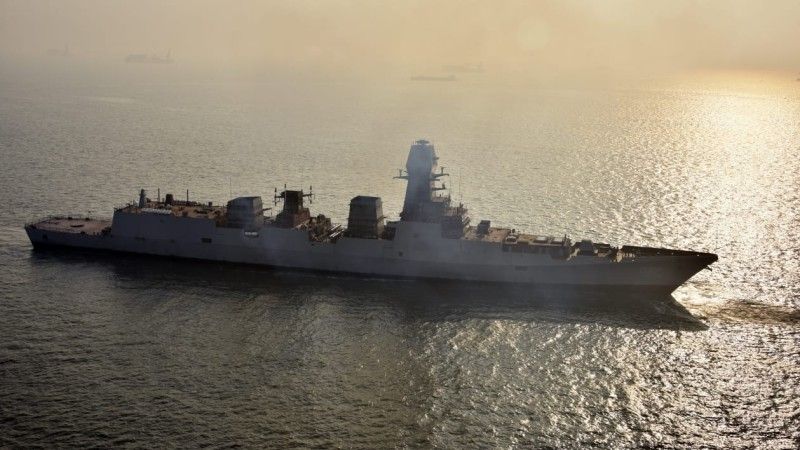Geopolitics
India responds to attack in Arabian Sea. Iran's strategic mistake and an opportunity for the West?

Photo. Indian Ministry of Defence - Twitter, GODL-India, commons.wikimedia.org
On December 23, 2023, there was an attack on the MV Chem Pluto ship (tanker/chemical tanker), most likely by an unmanned aerial system. The ship was sailing under the Liberian flag but had a crew of twenty-one Indians and one Vietnamese on board at the time of the strike. This incident forced India to become more active in protecting shipping lanes, but at the same time, it may have broader, long-term repercussions on regional policy.
Strong military projection in response to the attack
Mormugao (Visakhapatnam -class guided-missile destroyer), INS Kochi (Kolkata -class guided-missile destroyer), and INS Kolkata (Kolkata -class guided-missile destroyer ) would appear in the Arabian Sea. The ships will be supported from the air by the Indian P-8I aircraft and other navy vessels. P-8I is designed to combat surface ships and submarines and conduct ISR missions (gathering intelligence, reconnaissance, and surveillance) over long distances. Moreover, it is one of the most modern technologies the Indian military can use, not only in the maritime domain (an example of which was using these aircraft at the height of the dispute with the PRC in high mountain regions -LoC).
India is undertaking this type of air and sea operations as a result of concerns about the safety of navigation off the western coast of India and to deter other actors from escalating violence in the region. India is signaling that it will not consent to violate the delicate network of maritime connections with its country. Still, it will also not tolerate posing a threat to the life and health of its citizens who are part of the crews of merchant ships.
Will India explain who was behind the attack on the MV Chem Pluto ship?
There is also an ongoing Indian investigation into the attack on the chemical tanker MV Chem Pluto, which, after an explosion approximately 370 km from the Indian coast, was escorted by a unit belonging to the Indian Coast Guard, ICGS Vikram, and safely reached the country. We should also add that the MV Chem Pluto attacked from the air (the unit sailed from the Middle East) and found itself in the port of Mumbai (Bombay). MV Chem Pluto was inspected and pyrotechnically checked by military experts from the Indian Navy (Navy EOD team and other government agencies). The purpose was not only to secure the ship but to enable further investigative activities that could lead to identifying the actor behind the attack.
We should mention that the Americans suggest (the world media widely comment on the Pentagon’s position) that, unlike the recent attacks on civilian ships, which were behind the Yemeni pro-Iranian Houthis (a non-state structure controlling a large part of Yemen and directly supported by the Iranian Revolutionary Guards), the last attack on MV Chem Pluto was carried out and directly from Iranian territory. Iranian authorities reject the accusations and say US accusations make no sense. Thus, all eyes are now on Indian investigators, and, above all, the question arises whether there will be political will to reveal all the details of the December attack.
However, assuming a hypothesis that the Indian investigation would confirm the conventional „Iranian trace,” this would be a significant qualitative change. In the event of proving Iranian responsibility, international law repercussions would have to apply to a state actor who belongs to the Iranian government. And not to the previously mentioned Houthis, unrecognized by any country, used by Iran to destabilize maritime shipping. Moreover, India is not treated as a country directly involved in the US-Iran disputes. As such, the conclusions of its investigation could be treated more firmly in the international arena (especially in countries that are to some extent directly dependent on sea routes but do not want rapprochement with the US ).
Hence, attacking the MV Chem Pluto may be a huge strategic mistake for Iran if its role in the incident is proven. So far, unfortunately, many third-world countries have ignored Iran’s attempts to destabilize the situation in various areas, believing that it is only a problem for the US or Israel but not for them. A change in India’s attitude (even a practical one rather than a diplomatic and official one) may be a breakthrough. It will limit Iran’s capacity for sabotage and sabotage in the maritime domain.
However, in the long term, we see a new quality in India’s need to be a regional power with broader aspirations. First, it is all about ensuring maritime security for ourselves and the international community, on which the Indian economy largely depends. It increasingly depends on an extensive naval network with the West, the Middle East, and Africa. Hence, maritime needs are emerging, aimed at the natural rival, i.e., Pakistan, and a broader spectrum of threats. It overlaps almost simultaneously with the development of maritime competition with the neighboring People’s Republic of China (PRC). India can no longer passively observe the dynamics of maritime events and count on contractual stability guaranteed by the presence of the US Navy et consoretes. They must be able to protect, defend, and deter various state and non-state actors.
Will the new role of the Indian Navy bring this country closer to the West?
And, as can be seen now (after the attack on MV Chem Pluto), this is happening in practical conditions, and not only, for example, as part of joint naval and sea-air exercises conducted with allies. Moreover, India can now see the benefits of maritime exercises in the Asian QUAD configuration, where some of the scenarios involve ensuring the safety of navigation and countering various naval threats. It may strengthen the focus not only of the Indian fleet on deepening interoperability with other countries, including the West. At the same time, it cannot be ignored that there may be more significant modernization and development pressure on the naval forces of the emerging power.
It is related to lessons learned from this type of mission and those potentially conducted in the future. It does not necessarily mean only the potential quantitative development of the navy but also refers to qualitative changes. However, we should emphasize that this is not a significant surprise for the Indian side. India has been visible for a long time in various anti-piracy activities undertaken in the natural dimensions of the Gulf of Aden and the Indian Ocean, but also in the Gulf of Guinea and the Atlantic Ocean. In the latter case, INS Sumedha ended its patrol activities quite recently. India initiated activity there in September and October 2022 by sending INS Tarkash as the first vessel.
To conclude, we see an increase in needs on the Indian side, but it is a positive signal for the world and the West directly. A growing Indian power becoming more present on the seas and oceans guarantees assistance to others in their efforts for navigation safety and freedom. It often relieves the natural „guardian,” i.e., the US Navy and European maritime forces. Moreover, India is a country that also does not entirely (diplomatically speaking) agree with the aggressive methods used towards freedom of navigation by countries such as Iran or, above all, the PRC.
There is also a practical side to this new role of the Indian navy, army, and intelligence services. It is about India’s hardware and technological development and its defense potential. Of course, the Indian state strongly focuses on national programs („Made in India”), but this does not mean the possibility of developing cooperation with Indian entities. In this case, we are talking about possible profits for Western arms and technology companies, but above all about the possibility of further displacing Indian ties with Russia, which complicates relations with India in the current strategic conditions.
